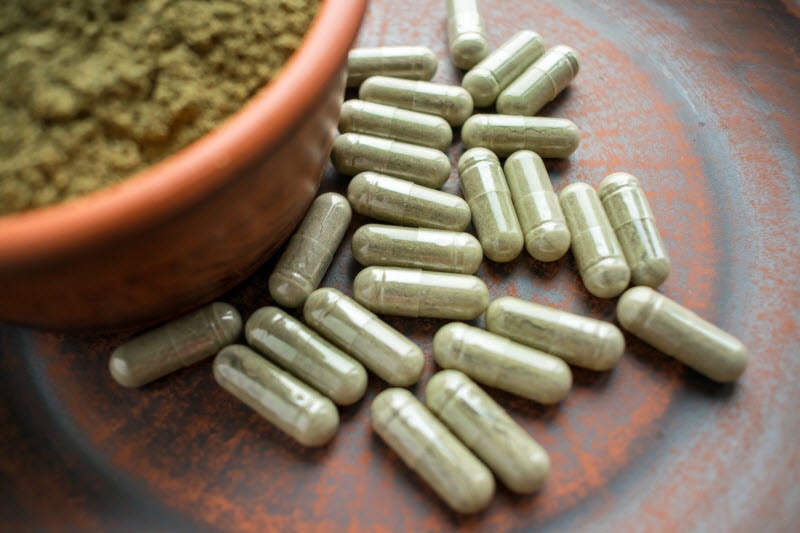Chamomile. Siberian Ginseng. Echinacea. Reishi. The mere names of herbal supplements sound exotic and alluring. Otherwise known as botanicals, herbs—which can be found in both foods and supplements—differ from vitamins and minerals in that they can be used for health-supporting purposes, and generally support a particular area of health such as bones or the liver. The value herbal dietary supplements offer, coupled with a collective interest in turning away from synthetic products, has led to a surge in their popularity.
But just because something is natural and over-the-counter doesn’t mean it can’t cause a host of complications. Some herbal supplements may interact with other medications, rendering what is prescribed ineffective—even harmful. Others contain potentially toxic properties. Others still possess ingredients that are contraindicated in certain conditions. And who hasn’t at one time taken handfuls of herbal supplements hoping to reach some goal—whether it’s weight loss or radiant skin—only to be massively disappointed?
Save yourself the frustration—and a possibly hazardous reaction—by following these top five tips for using herbal remedies safely:
1. Do your homework.
It’s tempting to blindly follow trends and load up your shopping cart with every great-sounding supplement on the market. But you wouldn’t dive into a plate of food without having some inkling of what you’re eating, would you? The same holds true for herbal supplements—only far more so.
Hoping to naturally enhance your eyesight with bilberry? Or support hormone balance with black cohosh? Research wisely, gaining enough knowledge to understand the supplement’s potential benefits and its potential risks and side effects (an herbal guide like this is a good place to start). Or, better yet, consult with a trained herbalist or naturopathic physician, both of whom can steer you in the right direction and keep your safety their #1 concern. The investment in time and energy is a no-brainer; this is your health that’s at stake.
2. Check for a seal of approval.
Different brands offer different ingredients and concentrations. Once you know which natural herbs might be right for you, inspect their labels—carefully.
Chief among what you should be looking for is whether the herb is standardized—a method in which the herb is chemically tested to determine the potency of its active compounds. Additionally, check the label to ensure that the supplement meets the FDA’s Current Good Manufacturing Practices (CGMP), which certifies that manufacturing processes are up to present standards and substantiates the product’s strength, quality, purity and identity while also screening for contaminants, deviations, mix-ups and other errors. Happen upon an ingredient that seems suspicious? Don’t hesitate to consult your doctor or herbalist. After all, when it comes to your health, it’s smarter to err on the side of overprotective.
3. Take your condition into account.
Herbal supplements might come from nature, but so do barley, hops, marijuana and poppies. In other words, consider your condition and general state of health before investing—let alone ingesting.
Pregnant or nursing? Get the low down on how herbal supplements might impact your child. Have a heart condition, or allergies? The same precautions apply as any other medicine. The more you know you know about herbal supplements and their impact on the body, the better equipped you’ll be to safeguard your well-being.
4. Understand how the herb may interact with other medications.
St. John’s Wort has long been used to naturally support a healthier mental state. But studies have shown that St. John’s Wort may have adverse consequences when mixed with other medications, from diminishing its own strength and making birth control less effective to causing other medications to become more toxic.
That is to say, herbal supplements are comprised of powerful components that, when mixed with other medications (as well as certain foods and alcohol), may interfere with the ways in which other chemicals are processed—intensifying the side effects of some meds while weakening the therapeutic benefits of others. Consult with your pharmacist or physician first, and heed their directions.
5. Know the source.
Recent reports reveal that some herbal supplements from other countries aren’t what they say they are, or have been grown with pesticides and other contaminants. Other imports may also contain potentially damaging levels of cadmium, lead, mercury and other heavy metals.
Given that the authenticity of your herbal supplements is vital to both its safety and efficacy, it’s imperative to know where your supplement was sourced. Is the manufacturer reputable? Does the herbal supplement come from the US? In what type of environment was it cultivated and processed? How and when?
Getting to the bottom of your herbal supplements will get you farther away from potential dangers and fraudulent claims—and closer to optimal health. Which, let’s face it, is where you were meant to be all along.

